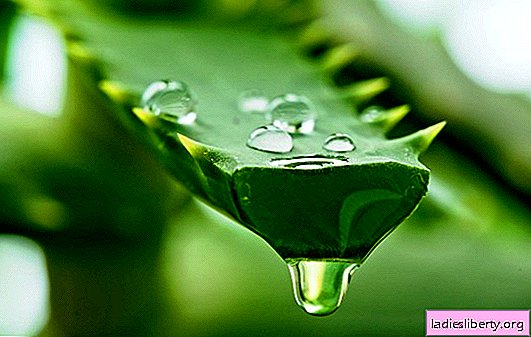
The beneficial properties of such a unique plant as agave were noticed in ancient times.
The miracle cure was actively used to treat skin lesions, burns, but for other diseases they tried to apply it no less often.
Over time, people still managed to identify all the positive qualities of an amazing plant and learn how to properly use aloe juice and pulp, including them in a variety of remedies for many ills.
The composition of aloe and the beneficial properties of the components
Aloe is a plant that has thick leaves that can retain moisture. It is their meaty part that is used in the treatment. It consists mainly of water, the active substances in it are about 1%. In total, the agave contains more than 150 components that together give it such beneficial properties for humans. As for the chemical composition, elements such as are concentrated in this plant:
• essential nutrients for humans. There are about 75 varieties of them in aloe;
• biologically active components, of which there are more than 150 species;
• 20 amino acids, including 8 indispensable ones;
• rich in aloe vera essential minerals and trace elements, of which there are more than 20 pieces;
• about 12 vitamins, including A, E, group B. Unique is the fact that aloe contains vitamin B12, which is usually found in animal protein;
• enzymes that are a catalyst for metabolism in the body;
• complex carbohydrates necessary for the body - polysaccharides;
• anthraquinones.
Variety of yarrow aloe: beneficial properties of the plant
Aloe or, as it is also called, agave is a plant widely used in traditional and traditional medicine, cosmetology. He is appreciated and loved in many countries of the world, because the agave is able to replace many medicines, and the spectrum of its use is truly great. Due to its unique composition, aloe is a real storehouse of vitamins and nutrients. So, scientists have proved a high level of vitamins A, B and E in aloe juice. Also, this plant is rich in tannins, flavonoids, amino acids and carotenoids. The healing properties of aloe are in its ability to cleanse the skin of bacteria and harmful substances, disinfect it and reduce inflammation. Also, the antiallergic and antispasmodic effects are attributed to the beneficial properties of the agave.
With the help of aloe, you can successfully cure:
• inflammation of the oral cavity resulting from tonsillitis and stomatitis;
• viral dermatoses and fungal diseases (mycoses);
• general intoxication of the body;
• Aloe is known for its diuretic and choleretic effect, it promotes the production of gastric juice, therefore it can be used to treat infectious diseases of the internal organs: urinary system, liver and gall bladder, stomach;
• Due to the cleansing properties, aloe is widely used in the treatment of skin diseases: eczema, various dermatitis. To do this, you can apply the plant directly to the affected areas;
• also the agave has excellent regenerative properties, so it can be safely used for the speedy healing of wounds and burns, leaving no trace of them;
• You can use this plant to stop bleeding as soon as possible. And thanks to the tannins in its composition, the agave is able to relieve vasospasm;
• irreplaceable aloe in cosmetology. It is known that its juice moisturizes and nourishes the skin, relieves it of inflammation, and also returns youth to the dermis, making it more elastic.
Aloe medicine application: beneficial properties of drugs based on agave
The beneficial qualities of aloe have long been noted by experts, and medicines based on this unique plant are created in a variety of forms.
1. Syrups.
First of all, these are syrups, to which add aloe pulp juice or extract from a plant. Often it is used as an auxiliary component in iron-based preparations, since aloe promotes its rapid absorption in the body. However, he has no contraindications for patients with anemia.
2. Powders.
The powder is made from dried agave leaves and has immunostimulating properties. Therefore, it is recommended to use it to strengthen immunity, especially in the cold season.
3. Juice.
This is the most popular way to use aloe. It is used to treat eye diseases, as well as in cosmetic procedures. Facial masks based on aloe juice tighten and moisturize the skin, reduce inflammation; hair masks nourish them and heal the scalp. In industrial processing, ethyl alcohol is added to aloe juice and is used for gastritis and other gastrointestinal diseases.
4. Pills.
Based on the agave, immunomodulating tablets are also made. To do this, the leaves of this plant are canned and crushed. In this way of using aloe, contraindications are present.
5. Liniment.
This product is a mixture of aloe juice, eucalyptus and castor oils. It copes well with burns of I and III degrees, lesions during radiation therapy and various skin diseases. The prepared liniment should not be frozen so that the useful qualities of the plant are not lost.
6. Aloe extract
It is used to mitigate the negative effects on the kidneys and liver while taking antibiotics.
7. Injection.
Aloe can also be presented in liquid for injection. Injections with aloe saturate the body with vitamins and nutrients, improve metabolism and increase the body's defenses.
Aloe Harm and Contraindications
Whatever the beneficial properties of the plant, aloe has contraindications. First of all, you need to remember that the use of aloe for medicinal purposes should be agreed with the doctor. He will prescribe the optimal dose, which will not harm the body and help to feel all the healing properties of this amazing plant. It is not recommended to take aloe to children and elderly people - this is fraught with an allergic reaction, because, as you know, their gastrointestinal tract is weakened and sensitive to any irritants.
You should not use agave for the treatment of exacerbations of chronic diseases, since in this case the plant will not do any good, but only increase pain. Experts also note that the use of aloe is extremely undesirable for hepatitis, heart disease, hemorrhoids.
Before using aloe directly, it is necessary to cut off the dense upper layer of the leaf, since it contains aloin. This is a toxic substance due to which the plant "protects" from eating animals. Aloin is not fatal to humans, but it can destroy healthy cells of the body, irritate the mucous membranes of the internal organs and intestinal walls, thereby causing a laxative effect.
With care, you should take the agave pregnant, as it is able to increase the tone of the uterus.











